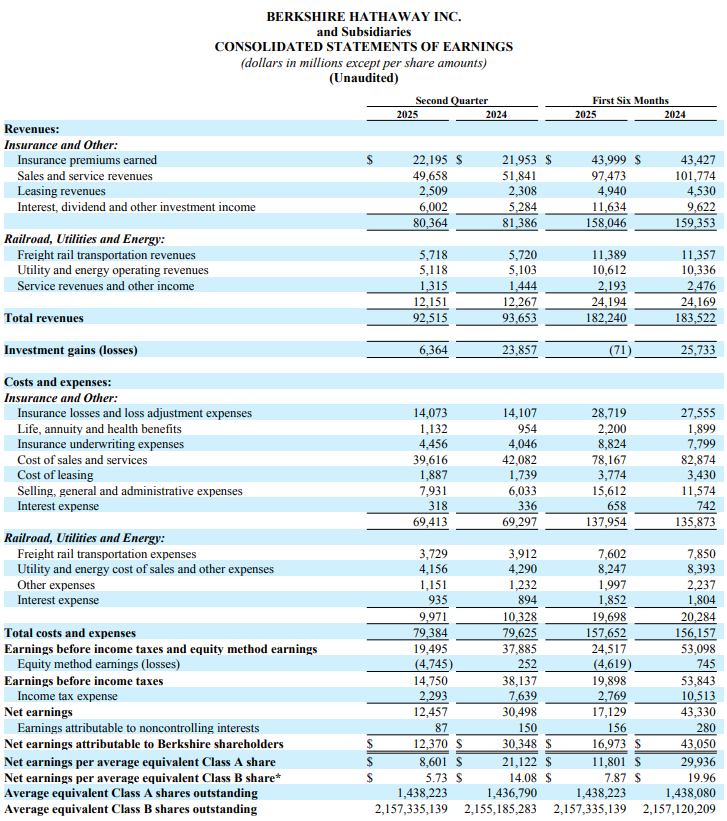Berkshire’s Q2 Profit Plunges 59% — Warns of Tariff Risks, Cash Reserves Fall for First Time in Three Years

TradingKey - Berkshire Hathaway, the conglomerate led by Warren Buffett, released its second-quarter 2025 earnings report, with net income plummeting to $12.37 billion, a 59% year-over-year decline — the steepest drop in recent years. Although revenue slightly exceeded expectations at $92.5 billion (vs. $91.9 billion forecast), core operating earnings fell 3.8% to $11.16 billion, reflecting structural challenges across its diversified business segments.

【伯克希尔2025年Q2财报,来源:BERKSHIRE HATHAWAY INC.】
The company highlighted that tightening international trade policies — particularly rising tariff risks — are now posing threats to multiple operations, including consumer brands in apparel and toys. Berkshire issued a clear warning that “almost all of our operating businesses and investments could be adversely affected,” signaling growing concern over geopolitical developments.
Notably, the company remained a net seller of equities for the 11th consecutive quarter and conducted no share buybacks in Q2. Market analysts suggest this reflects Berkshire’s view that U.S. equity valuations are currently too high and lack sufficient margin of safety, amid concerns over potential market pullbacks. Meanwhile, its cash reserves declined to $344.1 billion, the first quarterly drop in three years, though still near historic highs.
By segment, BNSF Railway delivered strong results, with after-tax profit up nearly 20%. The insurance operations faced pressure from natural disasters, including wildfires in Southern California, leading to a 12% year-over-year decline in underwriting profit. On the investment side, the company recorded a $3.8 billion impairment charge on Kraft Heinz, revealing risks tied to Buffett’s earlier acquisition strategy.
Overall, the report sent a cautious signal: while operations remain solid and the balance sheet is exceptionally strong, a combination of trade tensions, extreme weather events, and stretched market valuations is complicating the path forward. The market reacted negatively in after-hours trading, with Berkshire’s shares falling over 2%.
Analyst Views:
Sarah Johnson, Goldman Sachs: Sarah Johnson said the decline in Berkshire’s earnings serves as a reminder of how economic cycles can impact even the most resilient large-cap companies.
Emily Chen, UBS Market Strategist: Emily Chen noted that the profit volatility among large corporations and the lack of M&A activity together reflect broader structural shifts in the market.
Cathy Seifert, CFRA: Cathy Seifert described the quarter as “underwhelming,” criticizing the company for failing to resolve the tension between its high stock valuation and the absence of share buybacks, and added that Berkshire is currently at a critical juncture between valuation premium and leadership transition.







